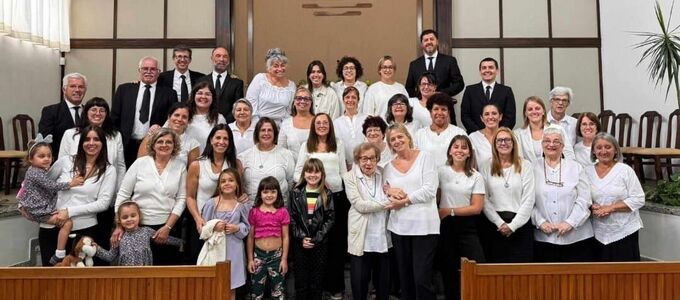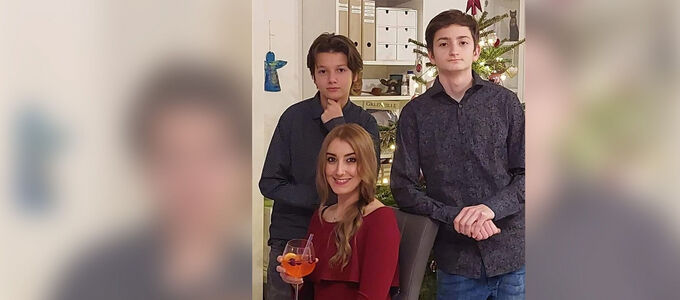
She had never been there before, but she was drawn to it: Irene Berger-Chreim was born and grew up in Uruguay, but wanted to go to Germany, the country of her ancestors. She emigrated and God was with her.
Montevideo is the capital of Uruguay and a lively, vibrant city. Compared to other capitals, Montevideo is less noisy, but there is always something going on. Here you see couples dancing the tango, people drinking mate tea, and artists selling their paintings in the streets. The city of 1.3 million inhabitants is located directly by the sea and is Uruguay’s industrial and cultural centre. There are many sights to marvel at and museums to visit, and thanks to the warm and humid climate all year round, you can always enjoy the beach.
Irene Berger-Chreim has been to this beach countless times, walked the streets of Montevideo, and drank mate tea. She now lives in Ammerbuch-Pfäffingen, a town in Germany with a population of two thousand. The village is surrounded by green fields and orchards. From there it is over four hundred kilometres to the sea as the crow flies. But Irene is happy, “I like living in a landscape where there is a lot of greenery. I enjoy the fields and the vibrant colours in the different seasons. That was totally different from what I knew at the beginning, and it still inspires me.”
Multicultural family
Irene is a second-generation Uruguayan. Her maternal grandparents immigrated to the South American country from Germany, her paternal grandparents from Austria. “We always practised the traditions of all three cultures,” says Irene, whose circle of friends today is still multicultural. “My father had an orchestra named after him and a Schuhplattler folk-dance group. This meant he worked a lot in German clubs. Four years ago, I celebrated my sixtieth birthday in one of these clubs and I found my grandparents’ names and beautiful old pictures on the wall.”
“Back” to Germany
“Many other members from my congregation in Capilla Union, who also had German ancestors but were born in Uruguay themselves, went to live in Germany.” Her aunt, for example, went to start a new life in Germany. “And at some point we also felt the desire to go ‘back’ to Germany. Somehow we were drawn to it.”
So, in 1979 the family emigrated to Germany. Irene, who had just completed her secretarial training and taken German lessons, was eighteen at the time. Her sister, who had married shortly before, stayed in Uruguay. The Berger family left behind everything they had built up for themselves in Uruguay. “It was kind of a wish, I guess,” Irene says.
The first snow
Irene’s father is Catholic, but her mother is New Apostolic. When they were children, her father did not want them to go to church. “My mother always fought with him so we could go to church. She took us with her every Sunday. From childhood, we only ever went to church on Sundays because there were too many confrontations.” In Germany, things were suddenly very different, she says, “Funnily enough, my father somehow accepted our faith here in Germany.” Irene and her mother were amazed at how friendly her father always was to the ministers during pastoral care visits.
Her life of faith took on a whole new intensity in Germany. Initially, the family lived with Irene’s uncle and aunt in their house in Sindelfingen. “I sang in the congregation’s Spanish choir and was involved in youth activities and quickly made friends,” she reports. She says that she always felt at home in all the congregations she has ever been of member of, both in Uruguay and in Germany. She especially enjoyed spending time with the youth in her congregation in Germany and doing things with them. “The youth from the congregations of Sindelfingen or Magstadt, where I was later, travelled to other regions. One time in winter we went on a trip to an area where there was snow. I had never seen snow before because there is no snow in Uruguay.”
Irene always made friends easily, even a little later in life. “The young people as well as the older ones always tried to come together.” Irene thinks that the tradition in some German congregations to have a cup of tea or coffee together after a divine service is a great way to get to know other members of the congregation.
Experiences that bring people together
Of course, there were also problems in her new home country. “There was the language barrier for me at the beginning. “And while back in Uruguay we were the Germans or the Austrians, in Germany we were the foreigners.”
At the age of 24, Irene gave birth to her daughter, Cintia. The little girl suffered lasting complications and health issues. “Cintia’s dad went to Portugal and we never heard from him again. He showed no interest in her.” During this time, Irene came to feel how important congregational fellowship is. She met other brothers and sisters who had disabled children. For example, a girl with Down syndrome. “I am still friends with the family to this day, even though we live an hour’s drive away from each other. We can share and talk about things. And we are both New Apostolic.”
Reaching out to others
Another time, Irene experienced the help of her fellow believers when she had to move out of her apartment. “A Priest from the congregation and his wife let me stay with them for a month until I found a new place.” That was in her current congregation of Ammerbuch-Pfäffingen, where Irene feels very much at home.
Even so, she did not attend divine services for a while during the Covid pandemic. “I had become a little lazy,” she admits. “After all, the services were on the internet.” But she felt lonely, she says. Cintia lives in a care centre in Reutlingen, while her younger daughter, Melanie, lives in Switzerland. “It does me good to go to church.” She went back to church and is glad to be able to spend time with her brothers and sisters.
“You have to get involved,” she says from her own experience, encouraging others who have moved to another country and are faced with the question of how they can actively live their faith. “You have to connect with people in the congregation, with the brothers and sisters. That makes things a lot more pleasant.”
















